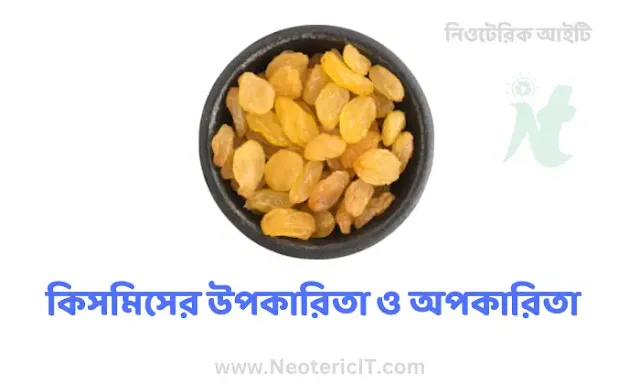Benefits and harms of raisins
Hello dear guest - Welcome to Neoteric IT . You have come to Neoteric IT for information about Benefits and harms of raisins Today I will conclude this article by discussing Benefits and harms of raisins in detail. Search Google to know more about Benefits and harms of raisins write Benefits and harms of raisins or click here insightflowblog.com for visit. See the page Table of content for know the main topic of this article. Web story and AMP Version
Raisins are a type of dried fruit made by drying grapes in the sun or in a dehydrator. They are a popular snack and often used in baking and cooking. Although raisins are generally considered a health food, there are both benefits and potential harms associated with eating them.
Benefits and harms of raisins - NeotericIT.com
Benefits of Raisins:
Nutrient-rich: Raisins are a good source of several important nutrients, including fiber, potassium, iron and vitamins B6 and K. They are rich in antioxidants, which can help protect the body from damage caused by free radicals.
May help lower cholesterol: Some studies suggest that eating raisins may help lower cholesterol levels. This is believed to be due to the high levels of fiber and antioxidants in raisins.
May help regulate blood sugar: Raisins have a low glycemic index, which means they can help regulate blood sugar levels. This makes them a good snack choice for people with diabetes or those trying to manage their blood sugar levels.
May Improve Digestive Health: Raisins are a good source of fiber, which prevents constipation and can help improve digestive health through regular bowel movements.
May help prevent anemia: Raisins are a good source of iron, which is important for red blood cell production. Regular consumption of raisins can help prevent anemia, a condition characterized by low red blood cell count.
Disadvantages or possible harms of raisins:
High in sugar: Raisins are high in natural sugars, which can contribute to weight gain and increase the risk of conditions like diabetes and heart disease.
Can cause cavities: Raisins can be sticky and stick to teeth, increasing the risk of cavities and tooth decay.
May contain sulfites: Some raisins are treated with sulfites to preserve their color and flavor. Although sulfites are generally considered safe, some people may be sensitive to them and experience allergic reactions.
May contain contaminants: Raisins may contain contaminants like pesticides and heavy metals, which can be harmful to health if consumed in excess.
May interfere with medications: Raisins contain a compound called tyramine, which may interact with certain medications such as monoamine oxidase inhibitors (MAOIs). People taking these medications should avoid consuming large amounts of raisins.
Benefits of Cashew Raisins
Both cashews and raisins are nutritious foods that offer a variety of health benefits. But when combined, they can offer even more benefits. Here are some benefits of cashew raisins:
Good for heart health: Both cashews and raisins are good for heart health. Cashews are high in unsaturated fats, which help lower cholesterol levels, while raisins are rich in antioxidants that help protect the heart from damage caused by free radicals.
Improves Digestive Health: Both cashews and raisins are high in fiber, which can help improve digestive health by preventing constipation and promoting regular bowel movements.
Good source of energy: Both cashews and raisins are high in calories and can provide a quick source of energy. They are a great snack option for those looking for an energy boost between meals or before exercise.
May help lower blood pressure: Cashews are a good source of potassium, which can help lower blood pressure. Raisins are also high in potassium, making the combination of cashews and raisins a good option for people who want to maintain healthy blood pressure levels.
Good for bone health: Both cashews and raisins are good sources of minerals like calcium and magnesium, which are important for maintaining healthy bones. Regular consumption of cashew nuts can help prevent conditions like osteoporosis.
May help improve brain function: Cashews are a good source of magnesium, which is linked to improved brain function. Raisins are rich in antioxidants, which help protect the brain from free radical damage.
May help control blood sugar levels: Cashews are low in carbohydrates and high in healthy fats, which can help control blood sugar levels. Raisins have a low glycemic index, which means they can also help regulate blood sugar levels.
Benefits of Dates and Raisins
Dates and raisins are both nutritious foods that provide various health benefits. Here are some benefits of dates and raisins:
Good for digestive health: Both dates and raisins are high in fiber, which prevents constipation and can help improve digestive health through regular bowel movements.
Good for bone health: Dates are a good source of minerals like calcium and magnesium, which are important for maintaining healthy bones. Raisins are also high in minerals like calcium, magnesium and potassium, making the combination of dates and raisins a good option for maintaining healthy bones.
Good for heart health: Dates are rich in potassium, which helps lower blood pressure and reduce the risk of heart disease. Raisins are also good for heart health, as they are rich in antioxidants that help protect the heart from damage caused by free radicals.
Good for brain health: Both dates and raisins are rich in antioxidants, which help protect the brain from damage caused by free radicals. They are rich in vitamins and minerals that are important for maintaining healthy brain function.
Good for energy: Dates are a good source of carbohydrates, which can provide a quick source of energy. Raisins are also high in calories and can provide a quick source of energy.
May help control blood sugar levels: Dates have a low glycemic index, which means they can help control blood sugar levels. Raisins also have a low glycemic index, making the combination of dates and raisins a good option for people looking to maintain healthy blood sugar levels.
May help improve immune function: Both dates and raisins are rich in antioxidants, which can help boost the immune system by protecting the body from damage caused by free radicals.
Benefits of eating kichmich in the morning
Raisins are a popular snack that can be enjoyed at any time of the day. However, eating raisins in the morning can provide several health benefits. Here are some benefits of eating raisins in the morning:
Provides energy: Raisins are rich in natural sugars, such as glucose and fructose, which can provide a quick source of energy. Eating raisins in the morning can help jumpstart your metabolism and give you the energy you need to start your day.
Improves Digestive Health: Raisins are rich in fiber, which helps improve digestive health by preventing constipation and promoting regular bowel movements. Eating raisins in the morning helps regulate your digestive system and prevent digestive problems throughout the day.
Good for heart health: Raisins are rich in antioxidants, such as phenols and flavonoids, which help protect the heart from damage caused by free radicals. Eating raisins in the morning helps reduce the risk of heart disease and improves heart health.
Helps regulate blood sugar levels: Raisins have a low glycemic index, which means they can help regulate blood sugar levels. Eating raisins in the morning helps prevent blood sugar spikes and maintain healthy blood sugar levels throughout the day.
Good for brain health: Raisins are rich in antioxidants, which help protect the brain from damage caused by free radicals. They are rich in vitamins and minerals that are important for maintaining healthy brain function. Eating raisins in the morning helps boost brain function and improve cognitive performance throughout the day.
Promotes healthy weight: Raisins are a low-fat, low-calorie food that can help promote healthy weight gain. Eating raisins in the morning helps prevent overeating throughout the day and promotes healthy weight management.
Benefits of Honey and Raisins
Eating honey and raisins together may provide additional health benefits beyond those provided by each food individually. Here are some benefits of consuming honey and raisins together:
Increases energy:
Both honey and raisins are natural sources of carbohydrates, which the body converts into glucose to use as fuel. When eaten together, they can provide a quick and sustained energy boost, making them an excellent snack choice for athletes, students or anyone in need of a pick-me-up. The fructose in raisins is slowly released into the bloodstream, providing a sustained energy boost, while the glucose in honey is absorbed quickly, providing an immediate burst of energy. This combination can help reduce fatigue and improve performance.
Improves Digestion:
Raisins are an excellent source of dietary fiber, which helps keep the digestive system healthy and functioning properly. They can help prevent constipation, reduce inflammation in the gut, and increase beneficial gut bacteria. Honey has prebiotic properties, meaning it helps feed good bacteria in the gut and support a healthy digestive system. Together, honey and raisins can help promote regularity and support overall digestive health.
Supports the immune system:
Both honey and raisins have natural antibacterial and antioxidant properties, which can help support the immune system and protect the body from illness and disease. Honey contains enzymes and antioxidants that help fight harmful bacteria and viruses, while raisins are rich in vitamin C and other antioxidants that can help reduce inflammation and support the immune system. Honey and raisins eaten together can provide a powerful combination of nutrients to help keep the immune system healthy and strong.
Improves skin health:
Both honey and raisins are rich in vitamins and minerals that are beneficial for the skin. Honey contains enzymes that can help exfoliate and brighten the skin, while raisins are rich in vitamin C, which is important for collagen production and skin health. The antioxidants in both honey and raisins help reduce inflammation and protect the skin from damage caused by free radicals. Eating honey and raisins together can help improve skin health and reduce blemishes.
Provides anti-inflammatory benefits:
Both honey and raisins have anti-inflammatory properties, which can help reduce inflammation in the body. Chronic inflammation has been linked to a variety of health problems, including arthritis, heart disease and cancer. Honey and raisins taken together help reduce inflammation and protect against these diseases.
Helps in controlling blood sugar:
Although both honey and raisins are high in natural sugars, they contain fiber and other nutrients that can help control blood sugar levels. Eating them together can help prevent blood sugar spikes and crashes, which can be beneficial for diabetes or other blood sugar-related conditions.
What happens when you eat dry raisins?
Raisins are a popular snack enjoyed by many people around the world. When you eat raisins, several things happen to your body, including:
Provides energy: Raisins are a great source of natural sugar, which is converted into glucose and used by the body as fuel. Eating dried raisins can provide a quick energy boost, making them a great snack when you need a quick pick-me-up.
Improves Digestion: Raisins are rich in dietary fiber, which can help increase regularity and improve digestive health. When you eat raisins, the fiber in them can help you feel full and prevent constipation.
May Improve Bone Health: Raisins are rich in calcium and boron, two minerals that are important for bone health. Regular consumption of dried raisins can help strengthen bones and prevent osteoporosis.
May reduce the risk of heart disease: Raisins are a good source of potassium, which helps regulate blood pressure and reduce the risk of heart disease. The antioxidants in raisins may also help prevent plaque buildup in the arteries, which can lead to heart disease.
May help regulate blood sugar: Although raisins are high in natural sugars, they also contain fiber, which can help slow the absorption of sugar into the bloodstream. Eating dried raisins in moderation can help control blood sugar levels, making them a good snack choice for diabetics.
However, it is important to note that eating too many raisins can have some negative effects on the body. Raisins are high in calories and natural sugars, so consuming too much can cause weight gain and increase the risk of developing diabetes or other health problems.
Benefits of Almonds and Raisins
Both almonds and raisins are delicious and nutritious foods that offer various health benefits. When eaten together, they may provide even more benefits, including:
Increases energy: Both almonds and raisins are rich in carbohydrates, which are converted into glucose and used as fuel by the body. Eating nuts and raisins together can provide a quick and sustained energy boost, making them an excellent snack choice for athletes, students or anyone in need of a pick-me-up.
Improves digestion: Both almonds and raisins are high in fiber, which can help increase regularity and improve digestive health. The fiber in almonds can help prevent constipation and promote the growth of beneficial gut bacteria. Together, almonds and raisins can help keep the digestive system healthy and functioning properly.
Supports heart health: Nuts are a good source of healthy fats, including monounsaturated and polyunsaturated fats, which can help lower cholesterol and reduce the risk of heart disease. Raisins are also beneficial for heart health, as they contain antioxidants that can help reduce inflammation and protect against heart disease. Eating almonds and raisins together can provide a powerful combination of nutrients to support heart health.
Provides antioxidant benefits: Both almonds and raisins are rich in antioxidants, which can help protect the body from damage caused by free radicals. Free radicals are unstable molecules that can cause oxidative stress, which is linked to a variety of health problems, including cancer, Alzheimer's disease, and heart disease. Eating almonds and raisins together can provide a powerful dose of antioxidants to help protect against these diseases.
Can improve bone health: Almonds are a good source of calcium, which is important for strong bones. Raisins are also beneficial for bone health, as they contain boron, a mineral that can help strengthen bones and prevent osteoporosis. Nuts and raisins eaten together can provide a powerful combination of nutrients to support bone health.
May help control blood sugar: Nuts are low in carbohydrates and high in protein and healthy fats, which can help control blood sugar levels. Raisins, on the other hand, are high in natural sugars but also contain fiber, which can help slow the absorption of sugar into the bloodstream. Eating almonds and raisins together can provide a balanced meal that can help control blood sugar levels.
In conclusion, eating almonds and raisins together may provide a variety of health benefits, including improved energy, digestion, heart health, antioxidant benefits, bone health, and blood sugar management. By combining these two nutritious foods, you can enjoy their individual benefits while enhancing their overall effectiveness.
Thanks for read the post. You can also read the article in bangla - benefits-and-harms-of-raisins
You are indeed a valued reader of Neoteric IT. Thank you so much for reading Benefits and harms of raisins article. Please let us know how you feel after reading this article.

 Follow Google News to get the latest Neoteric IT news
Follow Google News to get the latest Neoteric IT news 
.png)





Please comment in accordance with the policy - otherwise your comments will not be accepted.
comment url